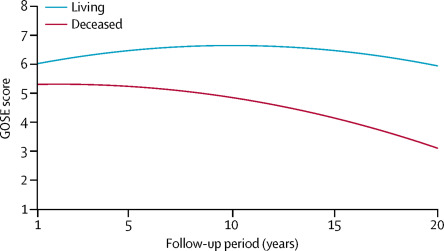Our official English website, www.x-mol.net, welcomes your feedback! (Note: you will need to create a separate account there.)
The chronic and evolving neurological consequences of traumatic brain injury.
The Lancet ( IF 168.9 ) Pub Date : 2017-10-01 , DOI: 10.1016/s1474-4422(17)30279-x Lindsay Wilson 1 , William Stewart 2 , Kristen Dams-O'Connor 3 , Ramon Diaz-Arrastia 4 , Lindsay Horton 1 , David K Menon 5 , Suzanne Polinder 6
The Lancet ( IF 168.9 ) Pub Date : 2017-10-01 , DOI: 10.1016/s1474-4422(17)30279-x Lindsay Wilson 1 , William Stewart 2 , Kristen Dams-O'Connor 3 , Ramon Diaz-Arrastia 4 , Lindsay Horton 1 , David K Menon 5 , Suzanne Polinder 6
Affiliation

|
Traumatic brain injury (TBI) can have lifelong and dynamic effects on health and wellbeing. Research on the long-term consequences emphasises that, for many patients, TBI should be conceptualised as a chronic health condition. Evidence suggests that functional outcomes after TBI can show improvement or deterioration up to two decades after injury, and rates of all-cause mortality remain elevated for many years. Furthermore, TBI represents a risk factor for a variety of neurological illnesses, including epilepsy, stroke, and neurodegenerative disease. With respect to neurodegeneration after TBI, post-mortem studies on the long-term neuropathology after injury have identified complex persisting and evolving abnormalities best described as polypathology, which includes chronic traumatic encephalopathy. Despite growing awareness of the lifelong consequences of TBI, substantial gaps in research exist. Improvements are therefore needed in understanding chronic pathologies and their implications for survivors of TBI, which could inform long-term health management in this sizeable patient population.
中文翻译:

创伤性脑损伤的慢性和不断发展的神经系统后果。
创伤性脑损伤 (TBI) 会对健康和福祉产生终身和动态的影响。对长期后果的研究强调,对于许多患者来说,TBI 应该被概念化为一种慢性健康状况。有证据表明,TBI 后的功能结果可以在受伤后长达 20 年内显示出改善或恶化,并且全因死亡率多年来一直保持较高水平。此外,TBI 是多种神经系统疾病的危险因素,包括癫痫、中风和神经退行性疾病。关于 TBI 后的神经退行性变,对损伤后长期神经病理学的尸检研究已经确定了复杂的持续和不断发展的异常,最好描述为多发性病变,其中包括慢性创伤性脑病。尽管人们越来越意识到 TBI 的终生后果,但仍存在大量研究空白。因此,需要改进对慢性病及其对 TBI 幸存者的影响的理解,这可以为这一庞大患者群体的长期健康管理提供信息。
更新日期:2017-09-12
中文翻译:

创伤性脑损伤的慢性和不断发展的神经系统后果。
创伤性脑损伤 (TBI) 会对健康和福祉产生终身和动态的影响。对长期后果的研究强调,对于许多患者来说,TBI 应该被概念化为一种慢性健康状况。有证据表明,TBI 后的功能结果可以在受伤后长达 20 年内显示出改善或恶化,并且全因死亡率多年来一直保持较高水平。此外,TBI 是多种神经系统疾病的危险因素,包括癫痫、中风和神经退行性疾病。关于 TBI 后的神经退行性变,对损伤后长期神经病理学的尸检研究已经确定了复杂的持续和不断发展的异常,最好描述为多发性病变,其中包括慢性创伤性脑病。尽管人们越来越意识到 TBI 的终生后果,但仍存在大量研究空白。因此,需要改进对慢性病及其对 TBI 幸存者的影响的理解,这可以为这一庞大患者群体的长期健康管理提供信息。



























 京公网安备 11010802027423号
京公网安备 11010802027423号